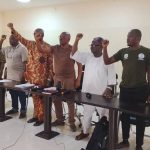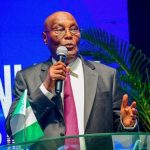Former House of Representatives member, Farouk Lawan, has been granted a presidential pardon by President Bola Ahmed Tinubu.
Lawan, who represented Bagwai and Shannon Federal Constituency in the National Assembly for several terms beginning in 1999, rose to national prominence as chairman of the House ad-hoc committee investigating the controversial fuel subsidy scandal in 2012.
His anti-corruption advocacy was overshadowed when he was accused of soliciting a $3 million bribe from oil magnate Femi Otedola to remove the businessman’s firm, Zenon Petroleum, from the list of indicted companies. A video later confirmed Lawan received $620,000 in the sting operation.
In June 2021, he was sentenced to seven years in prison by the Federal Capital Territory High Court for bribery and corruption. He regained his freedom on October 22, 2024, after serving part of his sentence.
In a statement signed by Bayo Onanuga, Special Adviser to the President on Information and Strategy, the presidential pardon for Lawan and other ex-convicts was described as part of efforts to reintegrate remorseful Nigerians into society.
The statement read: “President Tinubu granted pardons to enable them to integrate into society, having demonstrated sufficient remorse.”
The posthumous pardons extended to Major General Mamman Jiya Vatsa, sentenced to death for treason in 1986, and Nigerian nationalist Herbert Macaulay, co-founder of the National Council of Nigeria and the Cameroons (NCNC). Others pardoned included Mrs. Anastasia Daniel Nwaobia, Barrister Hussaini Umar, and Ayinla Saadu Alanamu.
The National Council of State, which met in Abuja on Thursday, endorsed the recommendations of the Presidential Advisory Committee on the Prerogative of Mercy (PACPM).
According to the committee, “A total of 175 inmates were interviewed…Eighty-two inmates were recommended for clemency; two for pardon; sixty-five for reduction of prison terms; and seven on death row for commutation to life imprisonment.”
The committee also noted that age, health, length of service in prison, remorse, and acquisition of vocational skills were key criteria for the exercise of mercy.
Other notable beneficiaries include the Ogoni Nine, who were formally pardoned, while four of them received posthumous national honours. In total, 175 individuals were recommended for clemency, pardon, or reduction of sentences.
The Secretary to the Government of the Federation, Sen. George Akume, inaugurated PACPM in January 2025, describing it as “a significant step towards promoting justice, rehabilitation, and human rights in Nigeria.”





